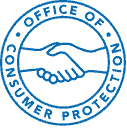
Avoiding Student Loan Scams
Paying for school can be a big undertaking. Understanding the difference between federal and private loans and your consolidation and repayment options can save you thousands of dollars. Some companies promise to help reduce student loan debt, but there’s nothing they can do for you that you can’t do yourself for free. And some of the companies that promise student loan debt relief are scams. It’s illegal for companies to charge you before they help you.
Warning signs that a student loan debt relief company may be trying to rip you off:
Pressure to pay high up-front fees. It can be a sign of a scam when a debt relief company requires you to pay a fee up-front or tries to make you sign a contract on the spot. These companies may even make you give your credit card number online or over the phone before they explain how they’ll help you. Avoid companies that require payment before they actually do anything, especially if they try to get your credit card number or bank account information. Not only is free assistance available through your student loan servicer, many times taking payment for debt relief services before providing help is illegal.
Promises of immediate loan forgiveness or debt cancellation. Debt relief companies do not have the ability to negotiate with your creditors for a “special deal” under these federal student loan programs. Payment levels under income driven payment plans are set by federal law and, for most borrowers, loan forgiveness is only available through programs that require many years of qualifying payments.
Demands that you sign a “third party authorization.” You should be wary if a company asks you to sign a “third party authorization” or a “power of attorney.” These are written agreements giving them legal permission to talk directly to your student loan servicer and make decisions on your behalf. In some cases, they may even step in and ask you to pay them directly, promising to pay your servicer each month when your bill comes due.
Requests for your Federal Student Aid PIN. Be cautious about companies that ask for your Federal Student Aid PIN. Your PIN — the unique ID issued by the U.S. Department of Education to allow access to information about your federal student loans — is the equivalent of your signature on any documents related to your student loan. If you give that number away, you are giving a company the power to perform actions on your student loan on your behalf. Honest companies will work with you to come up with a plan and will never use your PIN to access your student loan information.
STUDENT LOAN OMBUDSMAN: The Maryland Department of Labor, Licensing and Regulation’s Office of the Commissioner of Financial Regulation has a Student Loan Ombudsman to monitor student loan servicing activity. The Ombudsman provides assistance to student loan borrowers who have complaints regarding their loans.
COVID-19 Resource
The federal government has provided some relief for student loan borrowers, but only for Direct Loan and Federal Family Education Loans (FFEL) currently owned by the U.S. Department of Education. If you have a private student loan, the CARES Act does not provide you with any relief. Some private servicers are offering financial assistance, however. For more information on what some of these servicers are offering Click Here.
